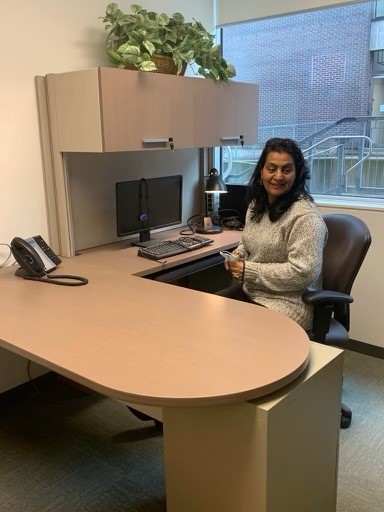Carleton’s journalism school will host a prominent Afghan journalist and human rights defender as a Journalist-in-Residence beginning Dec. 1. The new position is part of an effort to learn from media workers who were forced to flee Afghanistan when the Taliban came to power and also to provide support during the transition to a new life in Canada.
Journalist Farida Nekzad will take up her new post on Wednesday, with an office in Carleton’s journalism school and a mandate to engage with students, staff and faculty in the School of Journalism and Communication and to continue her research.
“I have to thank the Canadian government for providing humanitarian services and accepting Afghans,” Nekzad said. “And I would like to thank the leadership of Carleton University, especially the President of this academic institution, for creating such a position to encourage and support Afghan journalists. I am proud to take this opportunity to share my experiences and knowledge.”
Nekzad fled Kabul with her young daughter and her brother-in-law in early September, leaving behind other family members and her position as the director of the Centre for the Protection of Afghan Women Journalists. Earlier in her career she was the managing editor of Pajhwok Afghan News, one of the country’s largest independent news agencies.
Nekzad’s journey out of Afghanistan began on Aug. 15 when Taliban forces began to enter Kabul. On the advice of her husband – also a journalist – she left their home with her daughter and brother-in-law, initially staying with another relative before taking sanctuary in an airport hotel that was being used as a staging post for journalists and human rights defenders who needed to leave the country.
She told the Toronto Star in a recent interview that she initially had some hope that life might be possible under the Taliban. “I was waiting on the official position of the Taliban, I was thinking maybe the Taliban changed,” she said. “But then after two days a number of violations and human rights crises happened, they took people at midnight and tortured people. Two journalists were beaten badly. Then I said, ‘No, they haven’t changed’.”
Despite her hope that she could continue to build on 25 years of work as a journalist and advocate for press freedom, she made the difficult decision to leave, not least because she wanted to protect her 12-year-old daughter.
“It is a trauma for women,” Nekzad told The Star’s Olivia Bowden (who is herself a Carleton grad). “They are really living a nightmare.”
When she first arrived in Toronto, Nekzad and her family were supported by Canadian Connections, a grassroots group of volunteers that came together in August with a mandate to support Afghan families fleeing the Taliban. Canadian Connections works to bridge the gap between what the government can provide and what these families will require to settle in Canada.

Farida Nekzad settles into her new office at Carleton.
Allan Thompson, the head of Carleton’s journalism program, came in contact with Canadian Connections through broadcaster Lisa LaFlamme, Chief News Anchor for CTV National News. LaFlamme has been working behind the scenes to help journalists, interpreters and other human rights defenders who are fleeing Afghanistan.
“As a faculty, we decided that Carleton’s journalism school should step up and try to help fellow journalists,” Thompson said. “Farida is a remarkable journalist who has so much to offer to our students and faculty members. We really look forward to having her join us.”
Thompson said the focus will be giving Farida a chance to tell her story, to continue to advocate for fellow journalists in Afghanistan and to share her knowledge with journalism students and faculty members and the broader community.
“I would encourage other journalism schools and university departments to look at creating positions like this one. We have so much to gain by preserving and sharing the knowledge someone like Farida brings,” Thompson said.
The Journalist-in-Residence position was created with financial support from Carleton’s Faculty of Public Affairs, the university’s President and Provost, the Scholars-at-Risk committee and the journalism program itself. Coincidentally, Carleton’s Scholars-at-Risk group is part of a Giving Tuesday fundraiser tomorrow.
“A key part of the mission of Carleton’s Faculty of Public Affairs is to help build better societies and stronger democracies and to address regional and global challenges,” said Dr. Brenda O’Neill, the Dean of Public Affairs.
“I can think of no better way of working to fulfill that mission than by engaging with a leading journalist from Afghanistan who is among the media workers and human rights defenders who have fled that country. Journalism students and faculty will have a golden opportunity to learn from Farida Nekzad and Carleton’s journalism school will also be able to help her make the transition to a new life in Canada.”